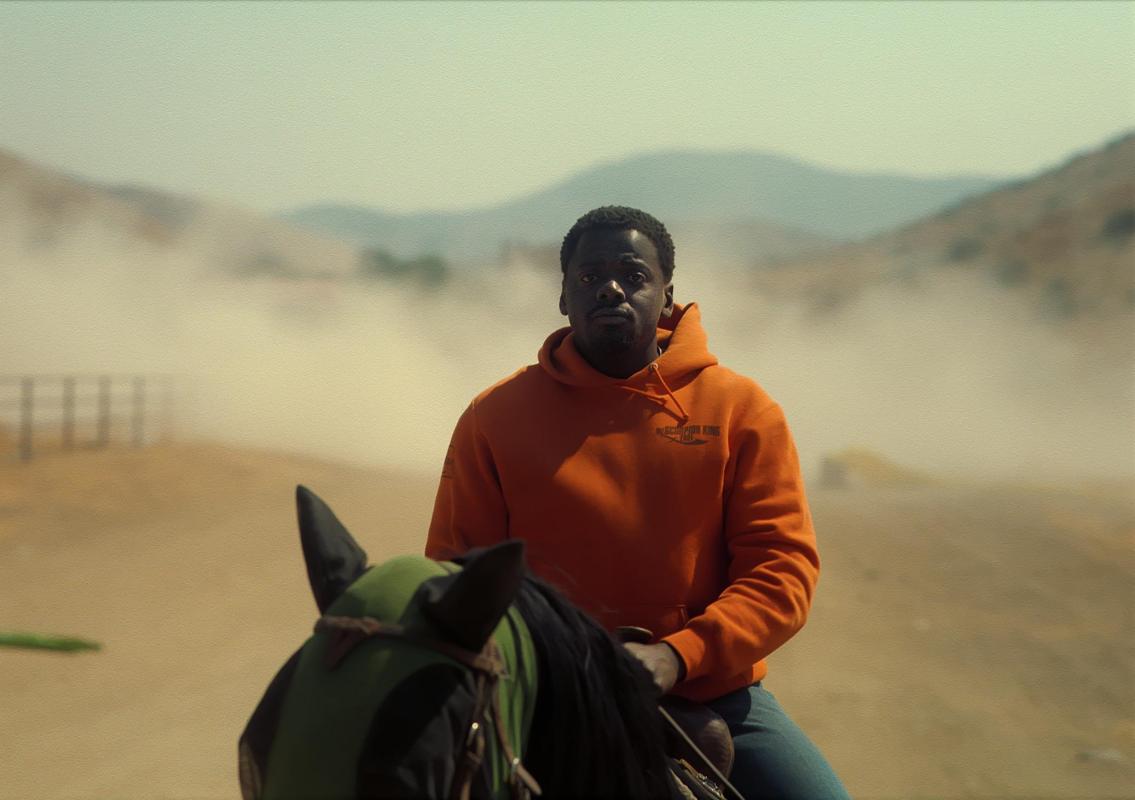
One great cliché of horror films is protagonists who run toward the danger—or make bone-headed decisions (like hiding in a closet) when trying to escape.
In Jordan Peele’s new horror/sci-fi/comedy Nope, the heroes stay put in the face of enormous danger, and even court it. But they have good reason, sort of.
They are brother and sister OJ and Emerald Haywood (Daniel Kaluuya and Keke Palmer, both excellent), who own a horse training ranch in California that provides horses to the entertainment industry. Early in the film, their father, Otis Sr. (Keith David) is killed by the sudden and inexplicable appearance of flying projectiles—keys, coins—which essentially stab him to death from the sky. They realize, rather quickly, that the source of this mysterious event is a flying object of some sort, which seems to have parked itself in a cloud over their ranch.
One reason they stay in the ranch has to do with OJ’s simple sense of duty—he’s not going to abandon his horses. The other is more questionable—Emerald realizes that if they can get a good video of the UFO they can become rich and famous—like, interviewed-by-Oprah famous.
The brother and sister couldn’t be more different. OJ is stoic, steely, brave—a cowboy archetype, although, of course, we’ve almost never seen a Black man in this role. Emerald is a live wire—a fast talking, self-promoting, buttinsky bundle of energy.
There are a few other noteworthy characters. One is Jupe (Steven Yeun), a former child star who now owns a ranch-themed novelty park that’s open to the public. When he was a young actor on the set of the very ’90s sitcom Gordy’s House, an unspeakable tragedy occurred. We learn about it in pieces, but early in the film we see the titular chimpanzee, a party hat shoved on his head, covered in blood. A female body lies on the ground—we just see her legs—and a single blood-splattered tennis sneaker stands at attention. Jupe clearly hasn’t processed the tragedy of what he saw. In fact, he’s profited off it—his theme park has a room dedicated to the grisly event. He’s a grinning huckster type, but every once in a while something dark passes over his face. He’s remembering.
Another significant player is Angel (newcomer Angel Torres), who works at a Best Buy type store called Frye’s. He’s the one who installs the video cameras the Haywoods hope will capture the UFO footage that will lead to their riches. But he’s lonely, smarting from a recent breakup, and the kind of AV Club nerd who of course is super interested in UFOs (and filled with government conspiracy theories about their existence) so he takes a special interest in the installation.
Finally, there’s the craggy, jaded cinematographer (Michael Wincott), known for being able to film the “unfilmable,” that the Haywoods recruit to help them get their shot.
I remember when, after the brilliant Get Out came out, I was dismayed to find out that Peele was going to exclusively focus his considerable gifts on the horror genre. I was dead wrong. Us was a fascinating exploration of the fine line between what we perceive as the civilized and the uncivilized worlds and Nope grapples with enough issues of representation, voyeurism, exploitation, and spectacle to fill up 10 philosophy classes. Which is not to say it’s not just a straight-up thrilling and hilariously unhinged horror/sci-fi. Peele clearly knows how to direct gorgeous—Spielbergian, even—populist films with smart, subversive messages.
In Nope, one of the most enduring images is OJ atop a horse. Peele reminds us that the first man ever photographed was, in fact, a Black man on a horse. (It’s true! For more information, check out Theo Anthony’s All Light, Everywhere, which would actually make for a nifty double bill with Nope.) In Peele’s fictionalized account, it was OJ and Emerald’s great-great-great grandfather astride that horse. But the point remains same. When you close your eyes and picture a classic cowboy, it’s not a Black man who comes to mind. (The fact that our hero is named OJ—short for Otis Jr.—is clearly a sly joke. It was, after all, a Ford Bronco that OJ Simpson made his slow-speed getaway in.) Peele is setting out to recast that narrative—and scare, delight, and mesmerize us at the same time.
